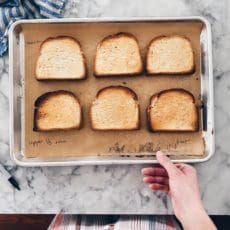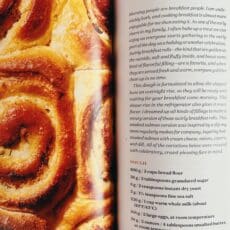Let’s talk about eggs!
Eggs play an important roll in our baked goods. Eggs add structure, leavening, color, and flavor to our cakes and cookies. It’s the balance between eggs and flour that help provide the height and texture of many of the baked goods here on Joy the Baker. It’s a balancing act.
Different parts of the egg pull the weight in different ways. When whipped egg whites are folded into a batter, they help the cake to rise. Angel Food Cake is a perfect example of the power of egg whites. Egg yolks add a really lovely richness and thickening power to custards and ice cream bases. Cookie No-Dough Ice Cream is a prime example of the luscious thickening power of yolks. Yes… I just said luscious.
When whole eggs are heated, they become firm… we know this from eating hard-boiled eggs for breakfast. That’s the structure that helps bind our cakes. Finally, when beaten eggs are brushed onto unbaked crusts, they make the most wonderfully golden and shiny crusts. That’s a lot, right!? All from inside that light brown shell.
With all of the heavy lifting that eggs do in our kitchen, we really should talk about why we use a particular size egg in baking. Why Do We Use Large Eggs In Baking? Because it matters. Here’s the deal:
Here in the US we have different size eggs: medium, large, extra-large, and jumbo. The large the egg, the more egg goodness inside the egg.
Large eggs are about 57 grams or 3 1/4 tablespoons of egg. Extra-large eggs are about 64 grams, or 4 tablespoons of egg. Jumbo eggs are even larger.
Most baking recipes call for large eggs. If a recipe calls for two large eggs, that means the proportions of the recipe are counting on about 6 1/2 tablespoons of liquid egg. If we were to use extra-large or even jumbo eggs in place of large eggs, we’d adding far more liquid that the recipe proportions account for.
Now… there is some leeway in baking. It’s not always that 1 extra tablespoon of liquid will ruin a recipe. Let’s not get crazy. But, the more incorrectly sized eggs used in a recipe, the more the proportions are thrown. Four extra-large eggs instead of four large eggs means adding 3 extra tablespoons of liquid.
When it comes to successful baking (and successful living), we’re just trying to get as many things right as possible. Using large eggs, as most recipes indicate, is a part of that success.
If a recipe does not indicate the size egg to use, stick with large.
If a recipe calls for extra-large or jumbo eggs, like many of Ina Garten’s recipes do… raise your eyebrow and follow along. That either means buying larger eggs or weighing the eggs for accuracy. It’s weird though. I wish Ina knew that was weird.
There’s more in the Baking 101 game!
Baking 101: How To Read A Recipe
Baking101: Must We Sift This Flour?
Baking 101: Why We Use Unsalted Butter
Baking 101: The Difference Between Baking Soda and Baking Powder
Baking 101: The Difference Between Dutch Processed and Natural Cocoa Powder







Claudia
Silly question but… when you weigh the egg do you do so still in its shell or already cracked.
joythebaker
already cracked!
Beryl
How do you increase the proportons of a recipe if you use extra large eggs . Above only give the reasoning of liquid of the eggs if increase how do you change the recipe?
Taylor
Hi Joy, I’ve recently started raising chickens and ducks and they are finally laying! Yay! It’s hard to determine actual egg size since they are so inconsistent compared to the store-bought options. Having the gram measurements you listed above are so helpful! I generally find that the duck eggs are closer the correct size. My question is related to egg whites specifically as, I’ve heard pasteurized eggs are best for meringues etc.? Do you have any guidance in that space? I have not tested with our fresh eggs yet. THANK YOU!
Joel Hilsenrath
Oops, typo. “The large the egg …”, should be, “The larger the egg …”.
Diane Milligan
This article is very helpful, as I have been wondering for years how the size of eggs play a role in baking. I guess it is more difficult to “play with our food” in this case, because it really would throw off the entire recipe and desired outcome of the baked good. It is not as easy to just add more flour or baking soda/powder to make up for the lack of or extra liquid that comes from using the wrong size egg. I’ve done that before, and it really does make a difference. That is why baking is more of a Chemistry experiment. :)
Summer Slim
I am impressed with this website, very I am a fan.
Janet Allison
Ina’s Frozen Key Lime Pie calls for six extra Large yolks. I only have large eggs. How many extra large yolks should be used to equal six extra large yolks?
joythebaker
I would do 7 or 8
Ramona McCruden
I have a friend who loves cake, and other baked goods requiring eggs. However, she is sensitive to eggs. Is there another substitute for eggs in baking?
joythebaker
Eggs do so much work sometimes there hard to replace depending on the cake. Here are my Vegan Egg Substitutes: https://joythebaker.com/2014/09/baking-101-favorite-vegan-egg-substitutes/ and some other help: https://www.egglesscooking.com/egg-substitutes/
Denny
Wish I had seen this when people were commenting! Ina Garten has it right and you have it wrong. Egg sizes have shrunk considerably over the years so that what used to be a medium-sized egg is now called “large”. I automatically default to a larger size egg just because of that. What made me write to you now is that yesterday I spent a considerable amount of time and money making a pound cake and realized too late that I had used the mini-sized things they now call large eggs. Sure enough the damned cake is dry! I will never again used the incorrectly-labeled “large” egg in a baking recipe.
Vicki du Plessis
Hmmmm…I’m going to have to check I’m right but I’m fairly sure here in the UK our large eggs average out at about 67g which means if I’m using an American recipe maybe I should be buying medium eggs here(https://www.egginfo.co.uk/egg-facts-and-figures/industry-information/egg-sizes)….as if converting for our lack of cake flour isn’t irritating enough…and don’t get me started on having to work out your measuring in cups rather than by weight. Ah well, now I know…it explains so much about my trouble with american recipes.
Barbara
Let’s not forget that all that perfect protein helps us to feel better about all that fat and sugar! LOL! Hey – it’s how I justify it to myself!
Franzi
Hey there!
When talking about eggs and all the goodness they add to our foods, we should not forget to think about where the eggs we use come from.
Buy free range eggs at the least; or even better: Get organic ones or buy them from your local small farm shop. Knowing that the eggs you use come from happy chickens make you enjoy your food even more…!
xx
Grace Ann Ekström
I love the turquoise blue skillet in your photo! I managed to snag an antique Le Creuset dutch oven in this color at a junk shop on the way to Mendocino some years back (for just $3!!!!) and I love it! The man selling it said, when I asked how much it cost, “Well, I’m gonna have to take 3 dollars for it, since it has a scratch in the bottom.” I paid the money and ran back to my car with it before he realized what he’d done. Yes, the enamel is scratched off in a small, quarter-sized spot on the inside bottom but it is cast iron underneath so no problem there. I still get giddy when I remember that “steal.” Where did you get your skillet?
Kristen
I love these Baking 101 posts (among all of the others!). I was planning on studying pastry, but chose Nutrition instead and am so interested in food science and how I can combine both interests.
Love your blog and book!
Ana
Enjoying this series very much! Thank you!
Main
I agree with you that it differs a lot in size between eggs. And this is why eggs should always be counted in weight and not in units! I always change your recepies to weight messerments… It is just so much more precise! For example, if you say that the recepie calls for 3 eggs, I try to add about 170gr of eggs. (Weight for a yolk is about 18gr and the white is about 38gr).
joythebaker
cool!
Sini
Joy, your series is really great! And hey, your photography has improved so much lately (not saying it has been bad before). I love it! Keep it up!
joythebaker
thank you! i’m working on it!
ET
And please buy eggs from happy chickens that live good lives.
fusilliamy
the whole time i’m reading this i’m shaking my fist at Ina.
Kristin
Thank you for the information. I never know that was the reason you use large eggs.
Fabiola
Funny I saw this post. I’m from Brazil and my mother in law was here in Chicago visiting me… and we had a huge discussion a few weeks ago at the grocery store , about egg sizes. She wanted to buy the extra-large ones, as she says, makes any cake rise more beautiful, bigger and softer… I wanted to keep with what I know and have on all my recipes, the “large ones”. I won the fight over but still wonder about it…
Jenn
As a new reader of your blog I have to say some of my favorites are your baking 101 posts. They really reinforce the things I’ve been doing, but gives me answers or resources when people ask why, or when I try to develop my own recipes/ tinker with others.
I’m a fan of a lot of Ina’s recipes, and I almost always just use large eggs in them since that’s what I buy. It could be a leftover habit from her restaurant days when they were buying and making everything in bulk. Though that is really just speculation.
In a Trendy Town
Thanks for this advice, we need lots of tricks in cuisine!!!
https://inatrendytown.blogspot.com.es/
Michelle
That’s so useful! Apparently the sizes we use in Ireland are different to the US ones, meaning that using recipes from the far side of the water can be a bit hit and miss. Having a rough guide on weights will make things far more reliable!
Than Angell
Because I keep a small flack of chickens and sell some eggs I have had to work with the variety of egg sizes that chickens naturally give as well as learning in detail how the sizing works. Each egg size is a range. Not to mention that older eggs loose moisture. The sizes actually range from peewee to jumbo. Because the egg sizes are uniform steps of weight, it is exactly equivalent to use one medium and one extra large egg in place of 2 large. It’s worth the extra effort to figure out the equivalency to use eggs local pastured chickens.
Jessica
such a great post! I had no idea, you should do more great stuff like this!!
Rachel @ Twin Tough
Thanks for the info! Very helpful!
Claire (@Kurea_San)
Thanks for this very informative post. Have to say I’ve never heard of or seen Jumbo eggs before. Are they chicken eggs on hormones or from a different bird?
Claire xx
https://somewhereyonder.blogspot.co.uk/
kristen
i love this series. so useful! hope to see many more entries.
not so much baking-related, but how about something on salt in recipes? when to use kosher vs maldon vs table and how it can affect the recipe?
Amanda
Oh my goodness! The whole time I was reading this, I was thinking about Ina Garten, because she has said that her baking got dramatically better when she started swapping out large eggs for extra-large eggs in recipes. So, the recipes she has that call for extra-large eggs are most likely recipes that, at some incarnation had large eggs, and when she changed her egg philosophy, swapped them up for the larger ones. I think really, in this case, it’s not about absolute right or wrong, but about managing expectations. Using extra large eggs in a large-egg recipe, or vice versa will probably not harm the recipe, but will alter the texture somewhat. For example, cookies and brownies will become cakier with extra-large eggs, and denser or chewier with large ones.
Monica
Great posts, Joy. I enjoy reading and learning about these baking elements (and I’m trying to retain as much of the info. as possible). I love eggs and they are seriously magical. I used to buy XL eggs all the time so I had no problems with Ina’s recipes but then I started buying large ones and things got a little tricky. I’m just glad there’s a bit of leeway…
misspaulinevintage
lovely blog!!!X
Baker Bettie
Oh Ina. With her “extra large eggs” and “really good vanilla.” Gotta love her.
Can we also talk about how brown eggs and white eggs are really no different other than their shell color and the kind of chicken they come from. It drives me crazy when people state, “I only use brown eggs.” Just because they are brown does not mean they are better or necessarily organic.. Sure, a lot of organic eggs happen to be brown because we for some reason perceive them to be better, but chickens that lay white eggs can be raised organically too. The inside of the egg is the same.
Now I want some runny eggs and toast!
Shikha @ Shikha la mode
Great post, super informative. I’ve worked in restaurants where we actually had to weigh out our eggs for intense accuracy!
Jessica Janoski
I’ve been so frustrated in the kitchen lately as nothing seems to be baking as it should but alas! I have some insight as to what may be the problem. However, I live in Bolivia where the eggs are all very small and when a recipe calls for 1 lg. I just use what I have. Should I be going for two small eggs when a recipe lists 1 large or is it better to go without the extra liquid? The little things!
Jenny
I hate it when recipes use xl or jumbo eggs. I only keep large on hand.
Ashley
Ha! That is super strange about Ina’s recipes. You’d think she would just use more large eggs since they’re the standard…at least she’s not calling for duck eggs, although, they are amazing in baked goods!
Chrystal M
I’m surprised that when the ingredients say 1 large egg, people don’t understand that their is a different between small, medium and large. I do buy small eggs when they are on sale, but always opt for large when there is no sale. When cooking/baking I’ll use 2 small eggs in many recipes instead of 1 large. When we had our own chickens I could usually tell the difference by how they fit in the palm of my hand. Great piece!
Amber
Wow, I had no idea that egg size matters, although I do normally purchase large sized eggs. Thanks for this awesome, informative post!
Colleen
So informative and helpful, I’m so glad to know and CARE about this now :)
Susan
Eggs and their size seem to have changed over my lifetime. What today is a jumbo egg seems very similar to the large eggs I used growing up (I’m not that old but we got eggs from the “egg man”.
If I make my mom’s choc chip cookies, for example, and use large eggs, it is too dry. Am I imagining this, or has anyone else experienced the same thing?
Mary
These are really great posts! I would love to see one about using salt when baking. I always use unsalted butter and tend to use less salt than called for and sometimes none at all. But I always wonder if I’m missing something by not adding the salt. If it has a purpose that I don’t know. About, other than being a flavor enhancer ( I think).
joythebaker
we can definitely talk about salt! it’s a big topic, and i’m doing the research now!
Heather
Thanks for breaking it down for us Joy. I never knew exactly how much egg was in a large egg.
Maggie @ A Bitchin' Kitchen
I adore Ina Garten…but she drives me cray cray with her use of XL eggs! It’s so annoying to buy a completely different type of egg (major first world problem…I know)
joythebaker
we understand each other.
Gracie
Another rockin’ post about baking details that amateurs like me have no clue about! Love this! Thanks!
https://sometimesgracefully.com
VinVino
Anyone know if the ratio of yolk to whites changes with size or do they scale accordingly?
Emily
I’ve definitely been buying all extra-large eggs. Whoops. Thanks for the tips!
~Emily from The Orange Slate
https://www.theorangeslate.com
@emilyamccord
Ludina
You’re blowing my mind!!! I’m Italian and I so hope your book will be available in Europe too!
Really THANK you for what you’re doing, you are AMAZING. and you’re podcast is too.
You’re special
joythebaker
i’m glad you’re here!
katie @ ohshineon
i just love these posts… so helpful. i’ve totally fallen into the whole “large or jumbo oh let’s just use jumbo” debacle.
Skye
I have always wondered what the story with large eggs was. You have put my mind at rest. Thank you!
Michelle @ A Healthy Mrs
Great info, as always! :)
The Fashann Monster
Omg, I never realized how scientific cooking was. I think I’m just going to eat sandwiches everyday when I move out.
The Fashann Monster
Diane Milligan
You are partially correct. In baking, you are using Chemistry. Cooking (as in boiling water, or frying) is not quite as “scientific” as baking.
Jayne
I learnt this lesson early on in my baking experience. I always was (still is) cheap and wanted to save money by using smaller eggs but the texture of baked stuff were never right. So now, I only every but large eggs both for baking and for daily consumption. Good writeup, Joy!
Gaby
Bruce is right! I found when I do my recipes in Canada and in the UK i must adjust for egg size… Medium in the UK is a Large in the US! (we dont have extra large / jumbo). Confusing… :D
Bruce Andrews
Interestingly, a large egg in Australia is 50-58g, America is 57g, New Zealand is 62g, and Europe is 63-73g – so you could be adding in a significantly incorrect amount of egg if you use a recipe that doesn’t specify weight (unless you know the author’s country). It’s a bit of a minefield.
https://en.wikipedia.org/wiki/Chicken_egg_sizes
Brittany
Seriously, how does Ina not know that’s WEIRD?!
Whatever I still love her and adjust accordingly.
Belinda @themoonblushbaker
Great insight joy.We can not forget the magic it works to bind oil and water together to form Mayo and hollandaise.
I wondering how much does one egg yolk and one egg white weight for you? I have seen so many versions, I am so confessed sometimes.